- Home
- Robin Cook
Death Benefit
Death Benefit Read online
Table of Contents
Title Page
Copyright Page
Dedication
Acknowledgements
PART I
Chapter 1.
Chapter 2.
Chapter 3.
Chapter 4.
Chapter 5.
Chapter 6.
Chapter 7.
Chapter 8.
Chapter 9.
Chapter 10.
Chapter 11.
Chapter 12.
Chapter 13.
Chapter 14.
Chapter 15.
Chapter 16.
Chapter 17.
Chapter 18.
Chapter 19.
Chapter 20.
Chapter 21.
Chapter 22.
Chapter 23.
Chapter 24.
PART II
Chapter 25.
Chapter 26.
Chapter 27.
Chapter 28.
Chapter 29.
Chapter 30.
Chapter 31.
Chapter 32.
Chapter 33.
Chapter 34.
Chapter 35.
Chapter 36.
Chapter 37.
Chapter 38.
Chapter 39.
Chapter 40.
Chapter 41.
Chapter 42.
Chapter 43.
Chapter 44.
PART III
Chapter 45.
Chapter 46.
Chapter 47.
Chapter 48.
Chapter 49.
Chapter 50.
Chapter 51.
Chapter 52.
Chapter 53.
Chapter 54.
Chapter 55.
Chapter 56.
Chapter 57.
Chapter 58.
Chapter 59.
Chapter 60.
Chapter 61.
Chapter 62.
Chapter 63.
Chapter 64.
EPILOGUE
ALSO BY ROBIN COOK
ALSO BY ROBIN COOK
Cure
Intervention
Foreign Body
Critical
Crisis
Marker
Seizure
Shock
Abduction
Vector
Toxin
Invasion
Chromosome 6
Contagion
Acceptable Risk
Fatal Cure
Terminal
Blindsight
Vital Signs
Harmful Intent
Mutation
Mortal Fear
Outbreak
Mindbend
Godplayer
Fever
Brain
Sphinx
Coma
The Year of the Intern
G. P. PUTNAM’S SONS
Publishers Since 1838
Published by the Penguin Group
Penguin Group (USA) Inc., 375 Hudson Street, New York, New York 10014, USA ● Penguin Group (Canada), 90 Eglinton Avenue East, Suite 700, Toronto, Ontario M4P 2Y3, Canada (a division of Pearson Penguin Canada Inc.) ● Penguin Books Ltd, 80 Strand, London WC2R 0RL, England ● Penguin Ireland, 25 St Stephen’s Green, Dublin 2, Ireland (a division of Penguin Books Ltd) ● Penguin Group (Australia), 250 Camberwell Road, Camberwell, Victoria 3124, Australia (a division of Pearson Australia Group Pty Ltd) ● Penguin Books India Pvt Ltd, 11 Community Centre, Panchsheel Park, New Delhi–110 017, India ● Penguin Group (NZ), 67 Apollo Drive, Rosedale, North Shore 0632, New Zealand (a division of Pearson New Zealand Ltd) ● Penguin Books (South Africa) (Pty) Ltd, 24 Sturdee Avenue, Rosebank, Johannesburg 2196, South Africa
Penguin Books Ltd, Registered Offices: 80 Strand, London WC2R 0RL, England
Copyright © 2011 by Robin Cook
All rights reserved. No part of this book may be reproduced, scanned, or distributed in any printed or electronic form without permission. Please do not participate in or encourage piracy of copyrighted materials in violation of the author’s rights. Purchase only authorized editions. Published simultaneously in Canada
ISBN : 978-1-101-55367-1
This is a work of fiction. Names, characters, places, and incidents either are the product of the author’s imagination or are used fictitiously, and any resemblance to actual persons, living or dead, businesses, companies, events, or locales is entirely coincidental.
While the author has made every effort to provide accurate telephone numbers and Internet addresses at the time of publication, neither the publisher nor the author assumes any responsibility for errors, or for changes that occur after publication. Further, the publisher does not have any control over and does not assume any responsibility for author or third-party websites or their content.
http://us.penguingroup.com
To all the foster children
ACKNOWLEDGMENTS
A writer needs a lot of friends: At least this writer does. These are the friends that don’t mind fielding a call, often out of the blue, and being asked a question of fact or preference, or being willing to read an outline or character study and lend an opinion. You all know who you are, and thanks. Of course there’s always Joe Cox, who knows more about law and business than I’ll ever know, and Mark Flowenbaum, a real forensic pathologist. And, of course, there’s Jean Reeds Cook, who is a great reader and doesn’t allow me any slack. Thank you all.
PROLOGUE
KRASNOYARSK, RUSSIA
MARCH 14, 2011, 4:22 P.M.
Prek Vllasi touched his right forefinger to the scar on his upper lip, where the cleft had been crudely repaired when he was an infant. It was something he did without thinking many times each day, more often when he was under pressure. Right now, standing in a filthy room on the tenth floor of a derelict Soviet-era tower block in the Russian city of Krasnoyarsk, he was getting more nervous by the minute.
Prek checked his watch again and looked over at Genti Hajdini. Genti was leaning against a foldout table, periodically yawning as he worked on a fingernail with his pocketknife. Every time he saw Genti, Prek was slightly taken aback by the straight lines of his lieutenant’s beaky nose. From this angle, it looked more like the sharp end of a hatchet. Yes, he was sure the Chechens were coming, Genti had just told him for the tenth time. Good people back home in Albania had vouched for this outfit. Even though he could feel it, Prek checked the Makarov pistol stuck in his belt at the small of his back. The Puma bag containing 500,000 euros was on the floor. Genti had brought the guns and money hidden in a truckload of Turkish fruit he’d driven deep into Russia. No wonder he was tired.
There was nothing else to do but wait.
It was freezing—the temperature had topped out at twenty below and the sun would be gone in an hour and a half. Outside, the sky was the same dirty color as the buildings and the ground. Prek started pacing around the large room, what must once have been a communal area in the apartment block that sat just outside town. Prek was a meticulous man; he’d read up about Krasnoyarsk. Forty miles or so down the Yenisei River was the town of Zheleznogorsk, better known by its old Soviet name, Krasnoyarsk-26. This was a closed city, home to factories handling God-knows-what exotic and dangerous materials to make God-knows-which agents of destruction. Weapons-grade plutonium had been produced in three nuclear reactors there, the last of which had just recently closed. For years the Soviets simply dumped the radioactive waste from the nuclear plants straight into the river until they thought better of it and drilled hundreds of wells to pump the deadly sludge underground. Prek knew there was as much radioactivity as a hundred Chernobyls humming away in the caverns around here, another reason he’d be happy to get out of this place.
Quietly, two men walked in. Wiry and rug
ged-looking, they wore identical black overcoats. Genti looked up.
“Artur? Nikolai?”
One of them stepped forward until he was ten feet from Prek. “I’m Artur,” he said, and gestured back to his companion. “That’s Nikolai.”
Prek looked back and across to Genti, who nodded. These were the names he had been given: Artur Zakoyev and Nikolai Dudaev.
“This is a lot of money you’re asking for,” Prek said in Russian.
“This stuff isn’t easy to get,” said Artur. “If it’s easy to get, why do you need us? What do you want this for, anyway? You making a big boom somewhere?” Artur grinned. He was referring to the fact that the substance could be used to make triggers for nuclear weapons.
Prek winced. He’d seen better teeth on a mule.
“What we do with it is our business,” said Prek. “How do we even know it’s genuine? It needs to be good, not some old shit you had lying around in a warehouse.”
“You have to trust us. That’s why you pay us. You have the money?”
Prek looked down at the bag and kicked it toward Artur. Prek glanced at Nikolai standing behind his boss and to his right. That’s the second time he’s looked at his watch, Prek said to himself. Artur stepped forward and went down on his haunches, his hands in front of him. Everyone knew the drill: they kept their hands down and in plain sight by their sides. Artur unzipped the bag and pulled out a brick of hundred-euro notes and flicked through it with his thumb. Prek saw Nikolai glance at his watch again.
He’s waiting for someone, thought Prek. He looked at Genti, who was watching Artur counting money. He’s waiting for someone and they’re late.
“Now you have to trust me,” said Prek. He was in a hurry. “The money’s all there so I’ll take the merchandise.”
Artur stood up and held up his hands.
“Okay, okay.” His right arm still aloft as if he were taking an oath, Artur reached into his right coat pocket with his left hand and pulled out a small object. Prek rocked forward and back on his heels—he’d had no time to react but he knew Genti could shoot both Chechens in the head in a second. This wasn’t a gun—it was a small aluminum vial about three inches long and an inch around. Prek moved forward, took the vial, and put it in his pants pocket. Nikolai said something Prek didn’t understand and without another word, the Chechens turned and were gone, Artur clutching the bag with the money.
“Come on,” Prek said in Albanian.
When he reached the doorway, he turned left, the opposite direction to the way they’d come in and where the Chechens were now headed.
“The car’s back there,” Genti said, but Prek was running now, heading to a stairway on the far side of the building. They could hear loud voices echoing up from the other stairway and the sound of hobnail boots on cement. This was who the Chechens were expecting, and it wasn’t the chamber of commerce coming to thank the Albanians for their business. Fortunately, Russian timekeeping hadn’t gotten any better since the fall of Communism.
Guns drawn, Prek and Genti raced down the stairs. Prek saw parked police cars and black vans ahead, doors hanging open. He turned and ran around the back of the building, Genti following close behind. The Chechens were in front of them, running toward a solitary car parked in the corner of a walled-in courtyard. Fucking amateurs. Prek saw the opportunity.
The Chechens jumped in the car, Artur throwing it into reverse and backing up and around so the car faced forward. Before Artur could get it into drive, Prek and Genti were on the car, firing into the windshield three times each. Artur was hit and thrown back into his seat, his foot pushing onto the accelerator so the engine raced in neutral. Prek and Genti pulled open the doors and dragged the Chechens out. Artur was dead, his head blown open. Nikolai had been shot twice in the neck, blood bubbling out of his airway as his life ebbed away. Prek slammed the car into drive and took off, looking for another road out of the complex. Prek’s heart was threatening to break out of his rib cage and he cursed loudly. He was sitting on glass and he had to lean forward so his head didn’t come into contact with whatever of Artur’s gray matter was splattered on the headrest behind him.
“What happened?” he yelled.
“They sold us out,” said Genti. “There . . .” He pointed ahead to a track off the service road leading away from the apartment complex. He knew they wouldn’t last five minutes on a highway in a car with no windshield before being spotted.
“Hey . . .” Genti said as Prek slowed down on the unpaved road. Prek looked over and Genti turned his head to look in the backseat. Though streaked with blood, the Puma bag sat perfectly safe. Prek banged on the steering wheel and turned to Genti and both men laughed long and hard.
PART I
1.
COLUMBIA UNIVERSITY MEDICAL CENTER
NEW YORK CITY
FEBRUARY 28, 2011, 7:23 A.M.
The girl, twelve, awakens with a start. She’s lying on a thin mattress on a low, narrow bed and circling around her is a pack of girls. They’re older—sixteen, seventeen—and as they shuffle along, they’re staring down at her with obviously sinister intentions. Some are suppressing giggles, others are smiling, but these smiles aren’t signs of happiness, they’re smiles of anticipation. It’s still nighttime. There are other cots in the long room and the girl knows the other occupants are awake but they won’t move to help her because they know what’s about to happen.
Transfixed with terror, the girl is unable to react as the mob falls upon her. As she’s being dragged off the bed she sees her chief tormentor, the ringleader’s face twisted in a manic grimace. Still, she knows better than to scream for help. Somewhere in the dormitory, there’s suddenly a loud banging sound. And again.
Pia Grazdani, twenty-six, woke up in a panic and a cold sweat, unsure for a second of where she was. She breathed out with relief when she realized she was safe and in her dorm room at Columbia University Medical Center. Someone was banging on the door.
Taking another deep breath, Pia leaped out of bed in her flannel pajamas, took three quick strides to the door, flipped the dead bolt, and pulled it open. As she expected, it was George, her fellow fourth-year medical student.
“Pia, do you know what time it is? This isn’t a day you want to be late.” His tone was not as strident as the syntax suggested. At six-one, George Wilson had seven inches on Pia, but somehow he always felt smaller when he was in her presence. As he explained it to himself, she had what he called a tough, plucky personality and could at times be rather volatile.
Pia held the door open and George took a couple of steps into the small dorm room. Pia let the door close and turned and hurried past George, pulling her pajama top over her head as she did so. George looked at Pia’s bare back, at the cut of her shoulder blades framing her flawless olive-brown skin. She stood in front of her low dresser and pulled out some clothes for the day. As she did so she caught George’s stare in the mirror.
“Sorry, George, I couldn’t sleep and then when I could sleep I was dreaming. You go ahead, I’ll catch up with you later today.”
With that said, Afrodita Pia Grazdani turned her full attention to getting ready. When she pulled down her pajama pants, George turned his head and looked out the window. He would have preferred to watch her but was afraid to do so. Instead he concentrated on the dramatic view that he and the other medical students had learned to take for granted. He could see the giant George Washington Bridge connecting Manhattan with New Jersey. Its usual morning rush-hour traffic was at a standstill in both directions.
“It’s okay, Pia,” said George, “I’ll wait.” Then, searching for something to say, he added, “I guess you still haven’t figured out how to use that alarm clock I bought for you. I can’t get you up every day—you’ve got to do something about being on time. You could always use the alarm on your cell phone if you’d prefer.”
George stopped talking. He’d turned his attention back to the room and was immediately transfixed by the sight of Pia brushing her
jet-black hair. He felt an immediate crushing sadness. The few times Pia and George had slept together, four exactly, Pia had asked George to leave before he fell asleep. And each time she’d stood at that same dresser with her back to him brushing her hair, just as she was doing now. Over the course of time George had become painfully aware they hadn’t truly slept together at all those four precious times, they’d just had sex: Wham bam thank you ma’am, in reverse.
George was athletically inclined and good-looking in a preppy, stereotypical fashion with an unruly shock of blond hair and a ready smile. During his Ivy League college days it had drifted back to him that many preppy women found him to be a “hunk.” There had never been a shortage of willing girlfriends. But George had set his sights early in life on becoming a doctor and did not want to become involved. As a consequence, George’s romantic life had been a string of one-night stands and short flings with little emotional commitment. He’d hurt people, he knew, especially now that the tables had been turned and he was the “hurtee” rather than the “hurter.” With Pia it was completely different. She truly didn’t seem to care, and it drove him crazy. Numerous times he had told himself to forget her, that she was damaged goods, but he couldn’t. Instead he’d become obsessed to an extent. George desperately wanted to have a romantic relationship with this woman, but he had no idea what she wanted and why it hadn’t happened. He’d been trying during three and a half years of medical school.
“Come on, what are you waiting for?” Pia barked when she popped out of her tiny bathroom still applying a pale lipstick that was more for lip protection than color. She grabbed her medical student white coat, pulled it on, and draped her medical center ID around her neck. She held open the door behind her as if she were the one waiting.
Emotionally flummoxed, as per usual, George awakened from what could have been considered a petit mal seizure and followed her out through the door. He had to practically run to catch up to her as she hurried down the hall toward the elevators.

 Shock
Shock Mutation
Mutation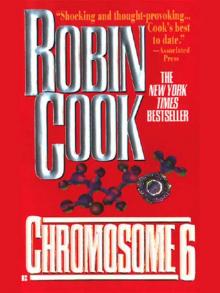 Chromosome 6
Chromosome 6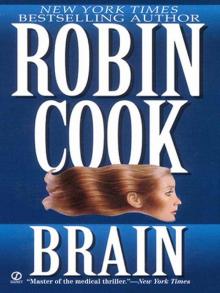 Brain
Brain Intervention
Intervention Invasion
Invasion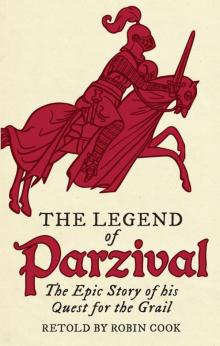 The Legend of Parzival: The Epic Story of His Quest for the Grail
The Legend of Parzival: The Epic Story of His Quest for the Grail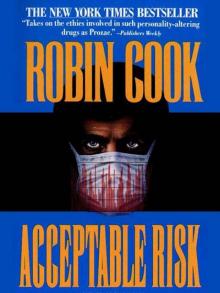 Acceptable Risk
Acceptable Risk Cell
Cell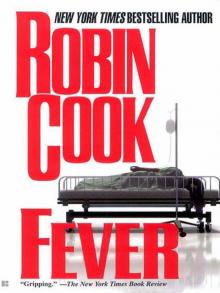 Fever
Fever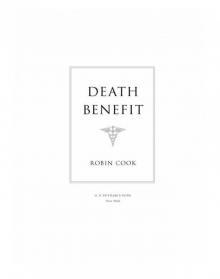 Death Benefit
Death Benefit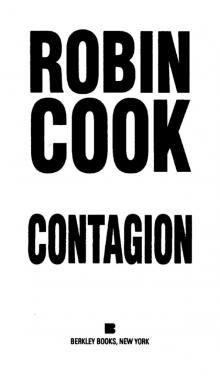 Contagion
Contagion Mindbend
Mindbend Coma
Coma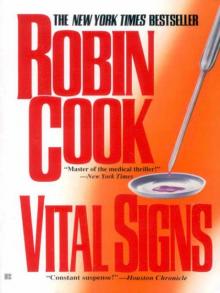 Vital Signs
Vital Signs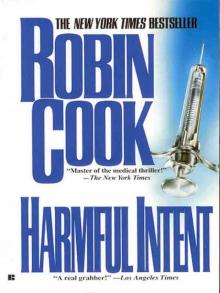 Harmful Intent
Harmful Intent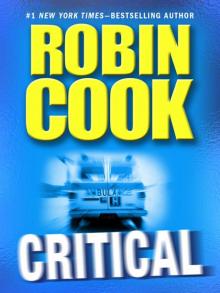 Critical
Critical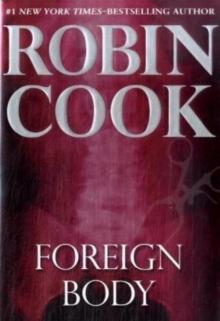 Foreign Body
Foreign Body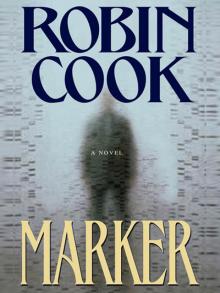 Marker
Marker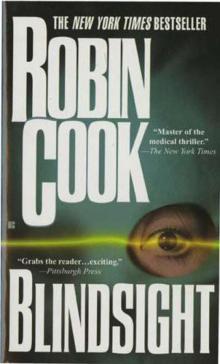 Blindsight
Blindsight Terminal
Terminal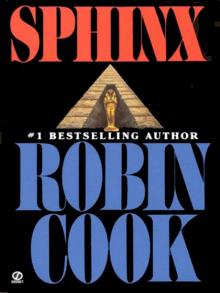 Sphinx
Sphinx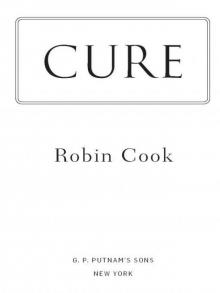 Fatal Cure
Fatal Cure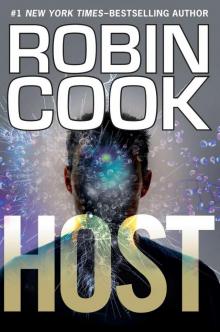 Host
Host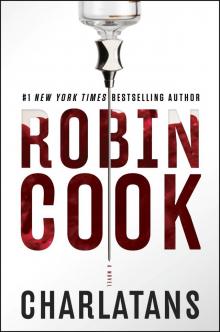 Charlatans
Charlatans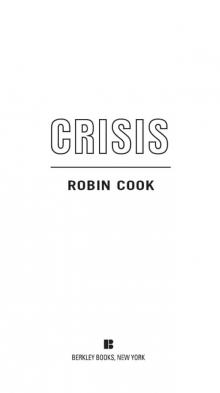 Crisis
Crisis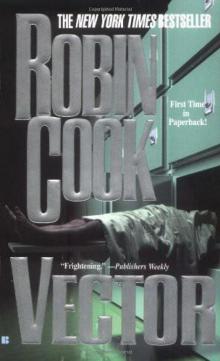 Vector
Vector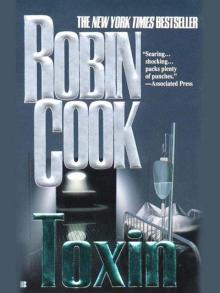 Toxin
Toxin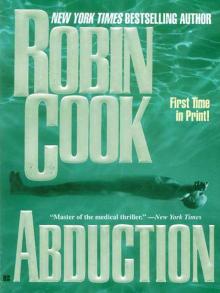 Abduction
Abduction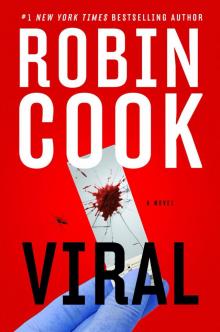 Viral
Viral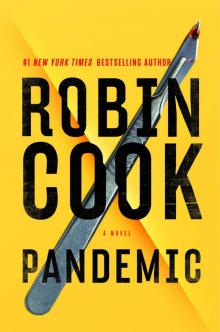 Pandemic
Pandemic Outbreak
Outbreak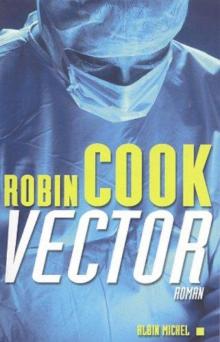 Vector js&lm-4
Vector js&lm-4 Godplayer
Godplayer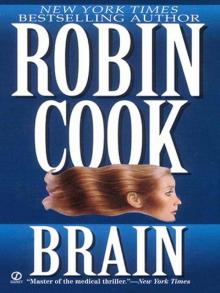 A Brain
A Brain Year of the Intern
Year of the Intern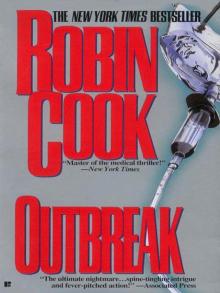 Outbreak dmb-1
Outbreak dmb-1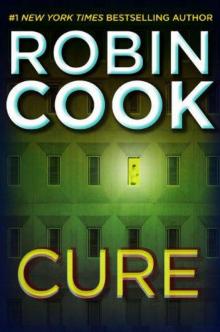 Cure
Cure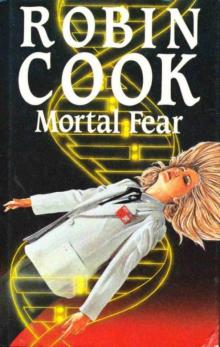 Mortal Fear
Mortal Fear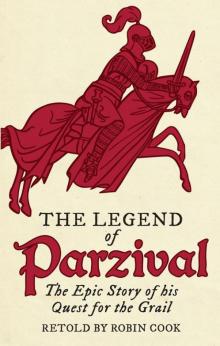 The Legend of Parzival
The Legend of Parzival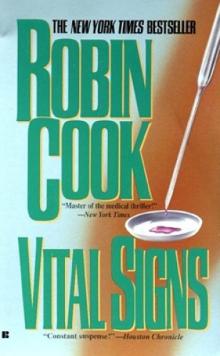 Vital Signs dmb-2
Vital Signs dmb-2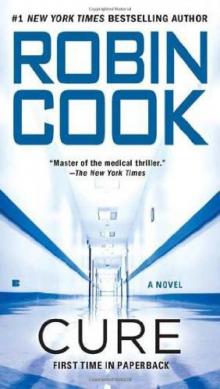 Cure (2010) sam-10
Cure (2010) sam-10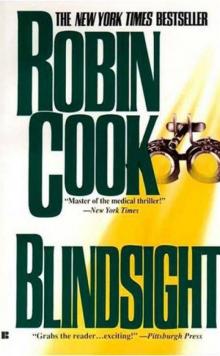 Blindsight sam-1
Blindsight sam-1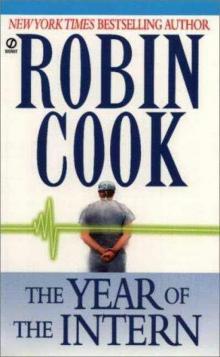 The Year of the Intern
The Year of the Intern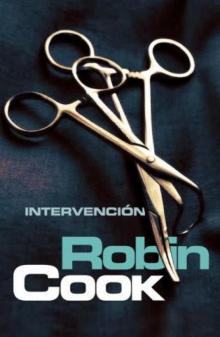 Intervention sam-9
Intervention sam-9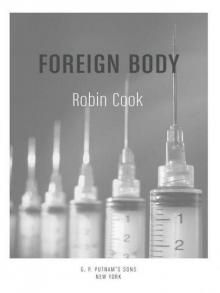 Foreign Body sam-8
Foreign Body sam-8